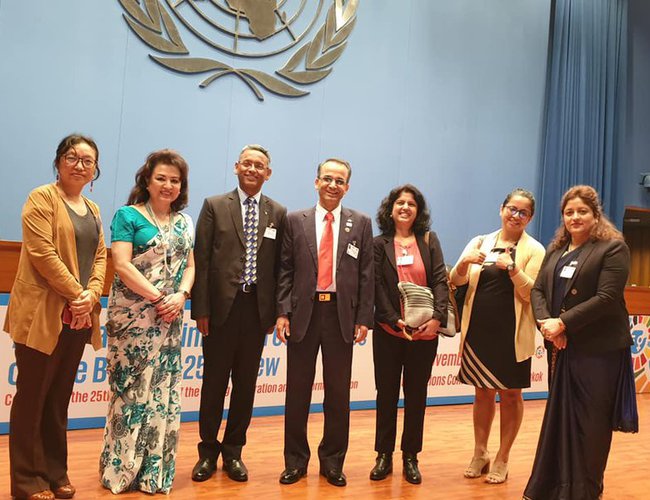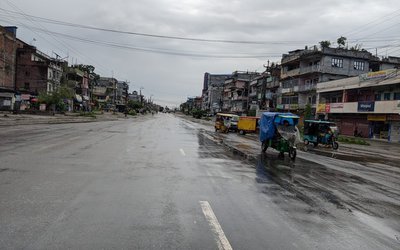
I express my deep appreciation to UNESCAP and UN Women for organizing this Ministerial Review Conference. We consider the Beijing Conference as a watershed moment in the history of gender equality and women empowerment. Over the last 25 years of the Beijing Declaration, Nepal has well internalized it and implemented a wider National level Action Plan. As a matter of fact, the country has leaped forward through a 'silent revolution'in gender equality and women empowerment.
I feel so proud to be a delegate from such an LDC, where more than 33 percent members of Federal Parliament, more than 34 percent of Provincial Assemblies and more than 41 percent of Local Assemblies are women.
The Constitution of Nepal is most progressive, democratic and inclusive in the world. It has incorporated “Rights of Women” as a fundamental right backed by independent judicial and other institutions. National Human Rights Commission and National Women Commission are actively working to safeguard constitutional rights for the benefits of women. Similarly, more than 90 percent of judicial committees at municipalities are led by women, which guarantee women’s access to justice at all levels.
Women empowerment and representation in Nepal go beyond the political sphere. For example, women’s participation in community forestry has reached to 59 percent. Likewise, cooperatives led by women have reached to 39 percent. Women representation is expanding in all areas from public administration to non-governmental sectors, including private sector and civil society.
Nepal’s initiative to attract and retain girls at schools has shown impressive result. In addition to this, federal government, provincial and local governments also have started innovative programs namely free distribution of sanitary pad, school admission campaign, midday meal scheme, scholarship for girls, among others. Due to such efforts, Gender Equity Index in basic education and higher secondary has reached to 1.0 and 1.02 respectively.
In the health sector of Nepal, ‘The Right to Safe Motherhood and Reproductive Health Act’ is now in effect. Government has incentivized women to visit health institutions for pre- and post-natal services. Women with complicated pregnancy cases in remote areas are rescued by helicopters to referral hospitals through President Women Upliftment Program, a national flagship program dedicated to women. The government is implementing the golden 1000 Days public awareness Campaign for improved nutrition of women of reproductive age and children under the age of two.
Nepal has the overarching national aspiration of 'Prosperous Nepal, Happy Nepali', as per the vision of our Prime Minister. To this end, the government has accorded high priority for making the entire Nepali society gender equal and free from violence against women and girls. The law of zero tolerance against gender violence is in active effect. The Government has launched this year a national campaign on
Violence against Women. Also, 24 Hour Toll Free Women Service Cells and Rehab Centers are in operation.
Government of Nepal is determined to develop a gender equality data system, calculate the value of unpaid domestic and care works and launch a survey for measuring the prevalence of gender violence. We believe that these initiatives will add value to the economic empowerment of women. 10.Above all, we have prepared a roadmap to achieve SDGs and link them with our periodic plan, medium term expenditure framework and gender responsive annual budget.
The mission of gender equality in Nepal is not free from challenges due to patriarchal mindset, harmful social practices, superstition and stigma in the society. Apart from this, low institutional capacity and inadequate resources also hinder the pace of women empowerment. In the pretext of migration for employment, women’s trafficking has become a pressing issue for which we are making every effort to mitigate.
In the future, all three tiers of government under the federal set up should allocate more resources for gender equality. Capacity of judiciary, security and local governments has to be enhanced. Partnership among government, private sector, civil society and development partners has to be further augmented.
In our goals of realizing gender equality and women empowerment Government of Nepal is always open to work together with our friendly nations, UN Agencies and civil society. We firmly believe that the declaration of this Ministerial Conference will provide us additional strength to make our planet 50-50.
Ghimire is the secretary of Ministry of Women, Children and Senior Citizens. Excerpts of statement delivered by secretary Ghimire, Head of Nepali Delegation and Secretary at the Ministerial Conference of Asia-Pacific on BPfA+25 Review Bangkok, Thailand November 27.
















